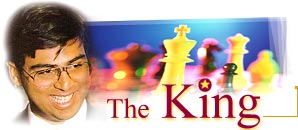
Part IX -- The Intervening Years
What does it take to challenge for the world crown, and lose? You only have to look at three instances from recent history to find the answer to that one -- and those instances are named Jonathan Speelman, Nigel Short, and Gata Kamsky.
In their time, all three were contenders for the world title. Each made his bid. And lost. And faded. Anand and Kasparov have, at various times, both used an indentical analogy to describe what it is like. Imagine you are climbing a mountain. You climb 95 per cent of it, and then have to quit and come back down. The mountain, meanwhile, remains -- its peak shrouded in mist, enticing you, challenging you, and at the same time, defying you, constantly reminding you that you weren't man enough to make it to the tippy-top.
Most simply give up. Very, very few have what it takes to try the climb again. In fact, in recent memory, the only one who has had the courage, the nous, to attempt the climb again has been Garry Kasparov, after his first bid for the world title against holder Anatoly Karpov ended in failure.
That then was the question that was on most people's minds when Anand emerged from the roof of the World Trade Centre a conquered man: Did he have what it took to climb back up?
There was, thus, keen interest in Anand's progress in the ensuing years. And in 1996, the Indian began providing the answer -- tying with Vladimir Kramnik for joint first in the Dortmund Tournament, winning the Credit Suisse Masters rapid chess tournament beating Garry Kasparov, and then appearing in the Las Palmas Super Cup, featuring the top six chess players in the world. This was the one that was the focus of attention -- if only because this was the first time after his defeat in the world title fight, that Anand was facing Kasparov in regular tournament play.
Kasparov won the tournament, Anand was runner-up. But most importantly, the faceoff between the two ended in a hard-fought draw, with both players doing their damndest to get the upper hand in a scrappy, take-no-prisoners middle game.
That match, and that tournament, answered a lot of questions. Anand was the second best in the world. Anand had what it took to bounce back from that WTC defeat. The only question remaining was, when would he make his next bid for the title?
That second bid came in 1988, in somewhat controversial circumstances, when after going through the grind of qualifying, Anand took on Anatoly Karpov in the final at Groningen. We will review that tournament tomorrow, as the penultimate part of this series before looking at his last, and successful, bid for the world title. Meanwhile, it needs mentioning that in 1997, Anand further reinforced his reputation by winning the Melody Amber at Monaco, in the process becoming the first player in the world to win both the blindfold and rapid sections. In that same year, 55 chess journalists selected Anand for the Chess Oscar (he was to repeat that next year as well) ahead of the rest of the field -- thus making him the first non-Russian after Bobby Fischer to receive that cachet.
We'll leave you for now with today's featured game -- the Anand-Kasparov faceoff from Las Palmas, 1996.
The game